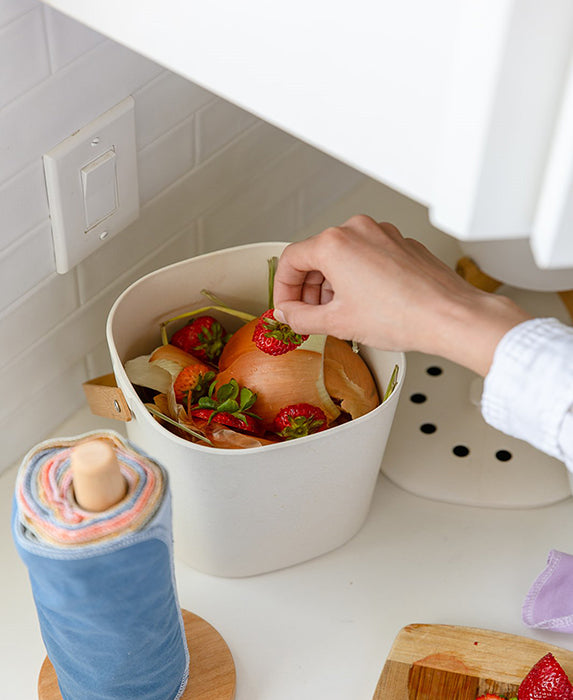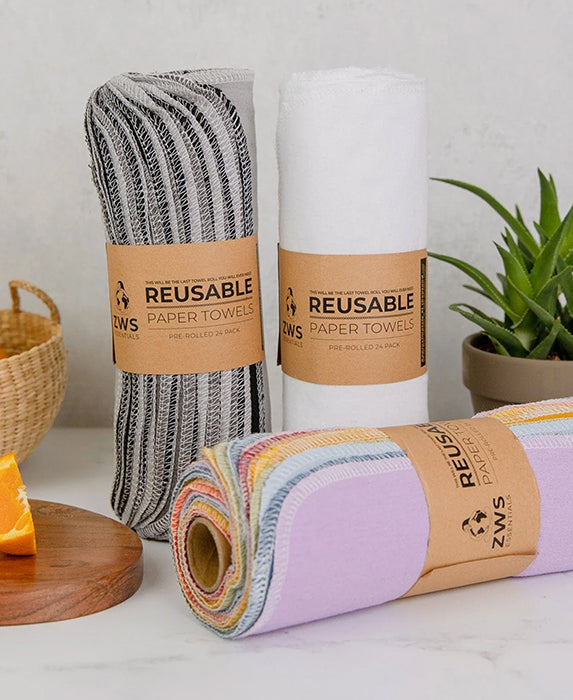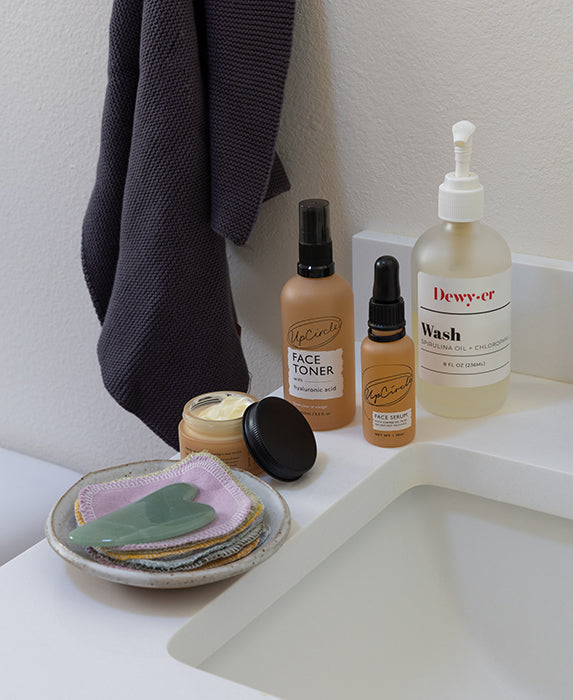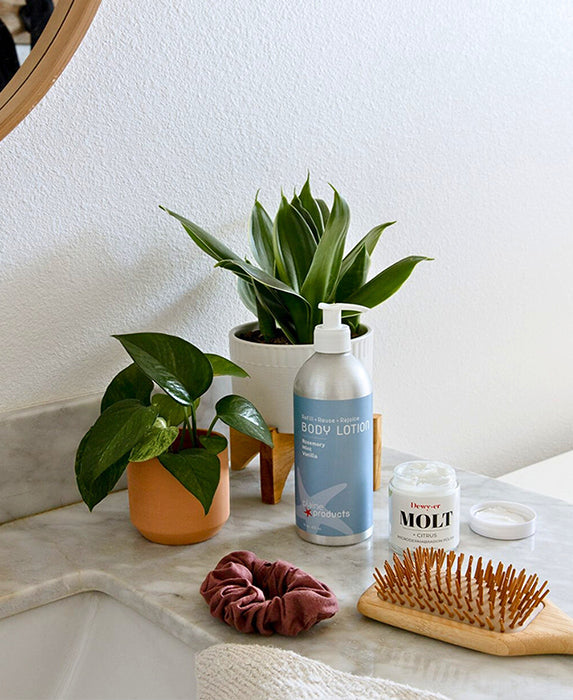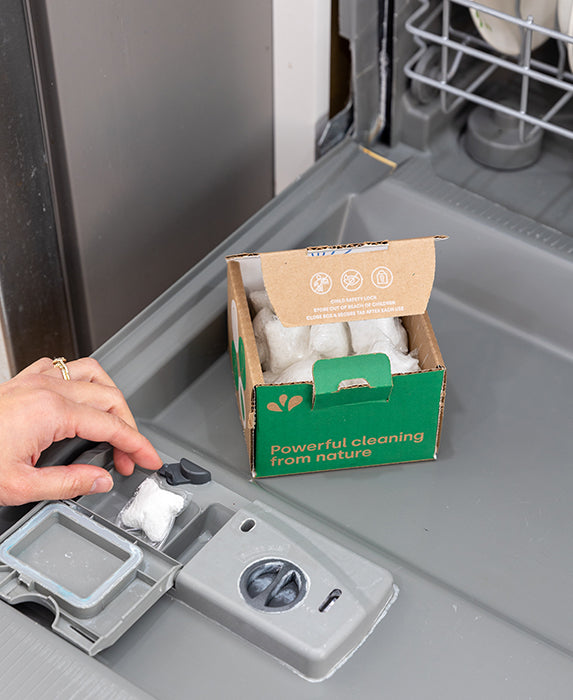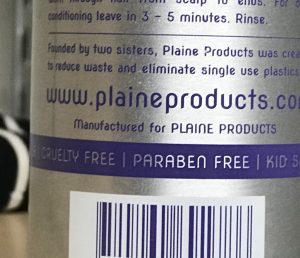The American Chemical Society estimates that parabens are in 85% of personal care products–meaning that you’ve probably applied parabens to your skin, hair, or teeth at some point today without even knowing it. But what are parabens, and should you avoid them? Read on to learn why you might be seeing “paraben-free” more and more often.
What are parabens?
For decades, parabens have been a key ingredient in the beauty industry for their use as a low-cost preservative–preventing bacteria and fungi from growing in your products and giving them a longer shelf life. They’re also widely used in pharmaceuticals, food additives, and even food packaging…all in the name of keeping things “fresh”. And while they’re known for hiding in cosmetics and skincare, researchers have found that around 90% of grocery store items also contain measurable amounts of parabens.
Simply put, a paraben is any group of synthetic compounds that are used as a preservative in cosmetics or pharmaceuticals containing water. According to the FDA, the most widely used parabens include methylparaben, propylparaben, and butylparaben (there’s also isobutylparaben and ethylparaben). These chemicals can be inhaled, ingested, and even absorbed through the skin.
Why are they a problem?
Here’s where it gets tricky–the FDA and American Cancer Society say that there isn’t enough evidence to suggest that parabens cause health risks or cancer in low doses (like what’s found in skin care or food preservatives). Now, we don’t know about you, but we’d rather exercise caution and play by the “dangerous until proven safe” rules, not the other way around. We’ll tell you why.
Parabens are able to artificially mimic estrogen, a female hormone, in your body. This disrupts natural hormone systems, and the excess estrogen is known to cause both normal and cancerous breast cells to grow and divide at a higher rate. This could lead to extra fat storage and male breast growth, alongside hormone-related neurological, hormonal, developmental, and metabolic disorders.
Ladies, listen up. Because parabens are highly prevalent in products targeted towards women (think tampons, makeup, or skin cream), we suggest being a little careful. In 2004, a British scientist named Philippa Darbre Ph.D. found parabens present in malignant breast tumors. This doesn’t prove that parabens=breast tumors, but the study led to experts worldwide recommending legal limits on parabens in cosmetic products. Despite this, the World Health Organization and the U.S. Food and Drug Administration (FDA) consider parabens safe at low levels. While the FDA allows limited paraben concentration in products, some scientists still worry that parabens can be stored in the body or interact with other chemicals, which could mean that they can accumulate over time and create even greater, cumulative health risks.
Our final verdict? Seek out paraben-free products. It can’t hurt you, and the worst case scenario is that now you’re using awesome certified non-toxic and organic products instead of preservative-packed synthetic ones. Researchers still have a long way to go on paraben research, but while they’re figuring all that out, we’ll be off enjoying our chemical-free personal care and natural skincare.
How can I avoid them?
At the end of the day, avoiding parabens comes down to one thing: reading the ingredients. Whether it’s a snack bar at the grocery store or your shampoo, you deserve to know exactly what is in a product. If you see any hard-to-read word that ends in –paraben, then don’t buy it. If the ingredients can’t be found on the product packaging, try going online for a full ingredient list, or opt to not purchase products from brands that aren’t forthcoming. A good tip when reading ingredient labels is that the ingredients will always be in the order of their prevalence, meaning that the first ingredient is highly concentrated in the product, while the last few ingredients are present in smaller concentrations.
Once you’ve switched over to paraben-free products, just remember, there’s a reason that parabens became so popular. Truly natural products will expire! Yes, just like food, organic skin care products have an expiration date because they don’t have the added preservatives to keep them fresh. Some organic skincare will even come in dark or clouded pump-containers to reduce the contact with light and air; two things that can degrade a product faster. If you’re like us and absolutely love natural products, try putting them in the fridge: it’ll help them stay fresh longer, and give you a refreshing boost during your skincare routine.

What are paraben-free alternatives?
The Environmental Working Group (EWG) performed a study that states the average adult uses 9 personal care products daily. Your skin comes in contact with personal care products a lot throughout the day, even if it’s just the essentials like hand soap and toothpaste. The good news is that natural and organic cosmetic companies have found effective alternatives for pretty much every single paraben-product out there. Natural preservatives include oregano, thyme, rosemary, goldenseal root, grapefruit seed extract, and even lavender oil! These natural preservatives also have their own health and beauty benefits–which is just another added plus to switching to paraben-free products. Not to mention, they smell great too!
When it comes to parabens, you might assume that ingesting it or putting it on your face would be the worst thing you can do. However, the one of the biggest concerns with parabens is actually… deodorant! Dr. Phillipa Darbre, a senior lecturer in oncology, notes that a disproportionate amount of all breast cancer tumors occur in the upper outer portion of the breast–the section closed to, you guessed it, our armpits. Nothing is proven, but we do know parabens are estrogen-imposters, and we also know that estrogen exposure is linked to breast cancer development. So, you do the math. Want to play it safe? Check out our favorite natural deodorants, here!

The Final Verdict
While there seems to be scientific uncertainty on if parabens are a complete no-go, we like to err on the side of caution when it comes to potentially dangerous chemicals. That’s why we’re hopping on the paraben-free (and phthalate-free) bus, and swapping our personal care products to natural alternatives! But, as we learned, parabens can be found in food packaging, food products, and other consumer goods too. Until more research comes out, we recommend reading the ingredients, shopping with companies who pledge against parabens, and choosing natural whenever possible.
Check out 4 beauty brands breaking free from plastic packaging next!

